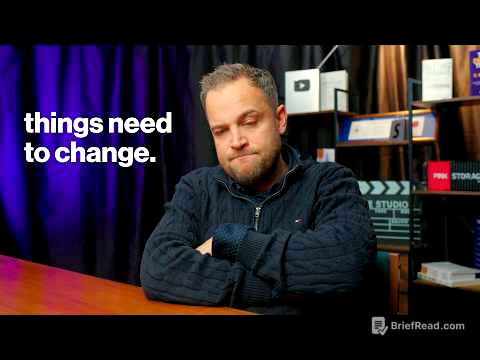TLDR;
The speaker discusses the importance of understanding and controlling our minds through metacognition, especially in the context of the modern world. Metacognition, or the ability to understand and control our own minds, is presented as a crucial skill for navigating the challenges of modern life, including managing attention, emotions, and addictive behaviors. The speaker argues that just as understanding our bodies has led to advancements in physical health, understanding our minds is essential for improving mental well-being.
- Metacognition is the understanding and control of one's own mind.
- Modern technology can hijack the brain's learning pathways, leading to compulsive behaviors and mental health issues.
- Metacognitive training can improve attention, emotional well-being, and memory.
Introduction: The Dark Room of the Mind [0:05]
The speaker begins by drawing a parallel between our historical lack of understanding of the human body and our current limited understanding of the human mind. Just as medicine was primitive when we didn't understand how our bodies worked, our interaction with our minds is currently in a "dark age." The speaker uses the metaphor of living in a dark house to describe how people navigate their own minds, stumbling and grasping without a clear understanding of their inner workings, leading to anxiety, depression, and the pursuit of easy pleasures. The speaker emphasizes that science is now beginning to illuminate the rooms of the mind, allowing us to understand and interact with our mental processes more effectively.
The Speaker's Personal Connection to Metacognition [3:34]
The speaker shares a personal connection to the research on metacognition, revealing that they were born with ADHD, a condition that makes it difficult to regulate attention. The speaker explains that they were able to navigate their challenges by practicing metacognitive techniques. This personal experience motivated the speaker to study metacognition for their PhD, with the goal of providing the same tools that helped them to other people.
Metacognition: Controlling Your Mind [4:10]
Metacognition is defined as the mind controlling itself, a natural process akin to controlling the body. Examples include focusing attention, managing emotions while working, and resisting distractions. While controlling the mind isn't always easy, it's essential for achieving important goals and fulfillment. Research shows that metacognition can improve performance in various fields, including sports, education, therapy, and business, because understanding the mind helps in directing it better.
The Importance of Metacognition in the Modern World [5:41]
The speaker emphasizes that learning metacognitive techniques is particularly important now because our brains, evolved for a different environment, are not well-suited for the modern world. Modern technology, including apps, games, social media, and online content, can hijack the brain's learning pathways, leading to compulsive behaviors, attention problems, and emotional issues. The pandemic has exacerbated this crisis, leading to social isolation and increased reliance on devices. However, research shows that metacognition can decrease addictive behaviors and improve attention and emotional well-being.
Training Your Mind: Practical Applications of Metacognition [7:39]
The speaker explains that metacognition is a skill that can be improved through training. This includes training attention through daily focus exercises and meditation, learning to better control emotions by resisting impulses, and training memory to remember complex things more easily. Mental training, like physical training, requires consistent effort over time to develop new capabilities. By being more deliberate with our thoughts, attention, and emotions, we can develop a toolkit of mental strategies to help us flourish.
Conclusion: The Future of Mental Well-being [9:11]
The speaker concludes by reiterating the importance of understanding and directing our minds, especially in the current era. Just as physical health depends on understanding our bodies, the future of our mental well-being depends on becoming intelligent about our own minds.









